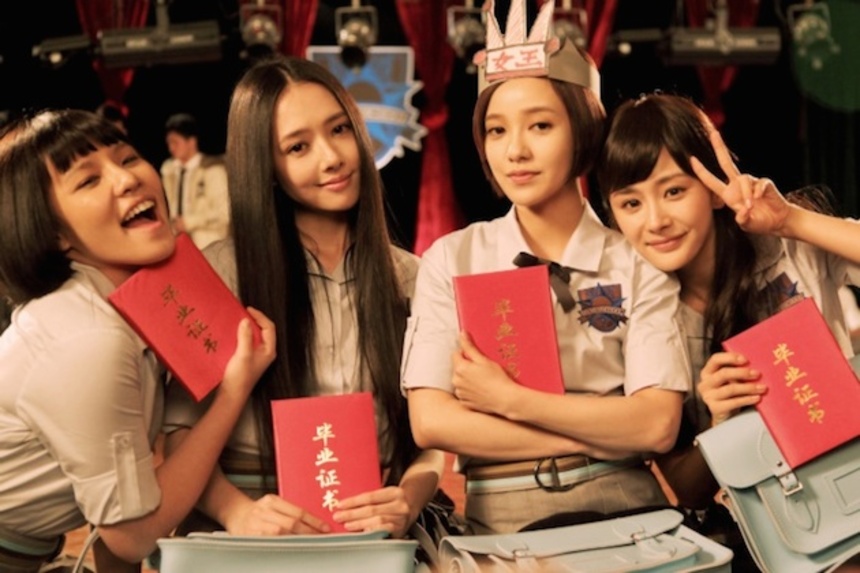Udine 2014 Review: TINY TIMES Is A Flashy, Slight Shanghai Rom-Com

Set against the backdrop of the great change that China is going through both socially and culturally, Guo Jingming's shamelessly ostentatious and lightweight rom-com Tiny Times belittles the otherwise impressive potential hidden in Shanghai's fashion sphere. With a sexual appeal infantile enough to serve one of the popular American teen series of the last decade, Guo's flashy and rich girl-powered tale of fulfilling dreams and maintaining one's aspirations finds drama in perhaps the most shallow junctures on a road to stardom.
Due to the very rapid and perhaps unprecedented pace of its constant transformation, the cinema of Mainland China is still in a rather fragile stage, though the process that it currently undergoes might be one of the most important ever. Tremendous amounts of money being invested in the industry allowed for many of the cherished national productions to travel abroad safely, but to find fame on foreign ground often proves to be harder than one might think.
Tiny Times' over the top showy appearance may be a thing of the past for most western audiences, but it doesn't come as a surprise that the film - along with a sequel that was shot together with its predecessor - was a huge box office hit in the domestic market. Though the film deviates from a path that would otherwise make it an ostentatious study of a lifestyle of the rich and famous, Tiny Times cultivates consumptionism with almost unflinching precision. And when it comes to product placement Guo's debut feature has an especially hard time staying within the boundaries of good taste.
To make it to the top of social hierarchy is probably only a dream for most of the viewers, and the glossy picture allows for one's thoughts to wander away into a fantastical world filled with luxury and high-end locations with ease, but the characters that guide us through this exciting but uneven territory seem emotionally detached and depthless.
The far-ranging choice of personality traits for the four protagonists is perhaps appropriate to make the interactions look more lively and diversified, but it takes no more than a couple of minutes (meaning: the familiar "waking up" introduction) for the westernized conventionality to take its toll. The main storyline focuses on Lin Xiao (Mini Yang), an initially clumsy and anxious girl who one day gets her dream job, even though she collapses in front of her future boss, prior to an interview. Most likely she charmed him with that "girl next door" look. Dream job quickly turns into nightmare, when she realizes how demanding and vicious fashion people can really be, but the persistence with which she maneuvers in rough terrain leads her from point A (I like sneakers and jeans) to point B (I love high heels and trendy clothes).
The leader of the group is Lily (Amber Kuo), a self-proclaimed, filthy rich queen and a young finance genius who won't hesitate to use her power and family contacts in order to help a friend in need. Though her funds are seemingly never-ending, it's still not enough to satisfy her boyfriend's insolent mother. Modest and beautiful Nan Xiang (Bea Hayden), on the other hand, has to work hard to make ends meet, but the effort finally doesn't go unnoticed. The least exposed character is Ruby (Hsieh Yi-lin), a plump badminton lover whose role is reduced to that of a jolly jester with no real goals in life.
College girls who've been friends for a long time should be aware of the importance of a true friendship, yet the way they interact with each other jeopardizes the essence of closeness and mutual understanding, while keeping the romantic element at an unbearably trivial level.
The jokes in Tiny Times come close to being intolerable, but the few likeable scenes that poke fun at the film's somewhat ironical passion for upscale goods give the narrative some space to atone for many of its poorly delivered lines. While the dialogue often revolves around clothing and boys-related issues (however to spot a kiss is almost impossible), what's meaningful here is that the ladies keep track of both short and long term objectives, hence the plot, with all its manipulative tactics, stretches out the limits of considered topics.
Tiny Times' skin-deep script offers little to confirm the film's huge aspirations, and even the forced happy ending doesn't help. Though sumptuously designed and deliciously lensed, Guo's lengthy rom-com lacks energy to entertain and eventually becomes the victim of its own shortsightedness.

Do you feel this content is inappropriate or infringes upon your rights? Click here to report it, or see our DMCA policy.






